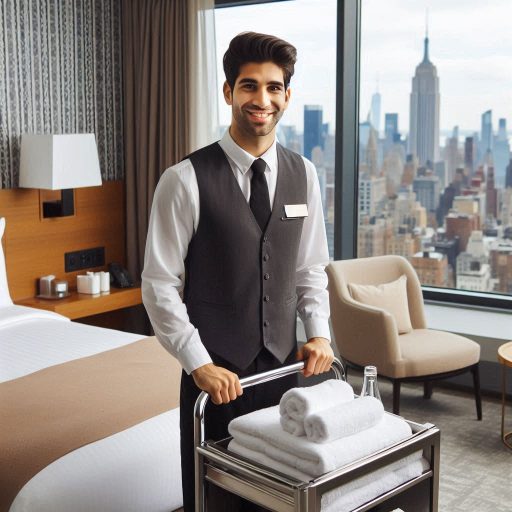Introduction
Hotel manager interviews are a crucial step toward landing a leadership role in the hospitality industry.
Being well-prepared can make a significant difference.
The interview process allows candidates to demonstrate their skills, experience, and ability to handle the demands of the job.
Confidently answering common interview questions sets you apart from other candidates.
It shows interviewers that you are knowledgeable and capable of managing a hotel effectively.
Preparation enables you to communicate your strengths clearly and highlight how your experience aligns with the role.
This blog post will explore common questions you may encounter during a hotel manager interview.
We will cover topics like how to handle guest complaints, manage staff, and increase occupancy rates.
You‘ll also learn how to explain your leadership style and approach to solving operational challenges.
By understanding these questions and crafting thoughtful responses, you will be better equipped to impress your interviewers.
Preparation is key to showing your expertise and securing the position.
In summary, mastering common interview questions can give you a competitive edge and improve your chances of success in the hospitality industry.
Tell me about your experience in the hospitality industry
Highlighting Relevant Experience in the Hospitality Industry
When interviewing for a hotel manager position, highlighting relevant experience is crucial.
Employers want to see proven skills in hospitality management.
Your experience demonstrates your ability to handle the challenges of running a hotel.
Start by emphasizing any previous roles where you managed teams, handled customer service, or oversaw hotel operations.
Show how your experience aligns with the specific needs of the hotel you’re applying to.
This ensures your background stands out as a perfect fit for the role.
Your knowledge of the hospitality industry should be evident in the examples you share.
Discuss your familiarity with key aspects of hotel management, such as guest relations, budgeting, and staff coordination.
Highlighting these areas shows your broad understanding of the field.
Experience working in different types of hotels, whether luxury, boutique, or budget, adds value to your candidacy.
Demonstrating versatility in managing various hotel settings makes you an attractive candidate.
Employers will see your adaptability as a major asset.
If you‘ve worked with hotel management software or handled property management systems, mention it.
Technological proficiency is highly valued in modern hotel management.
Highlighting this experience shows you’re equipped to manage both people and operations effectively.
Effectively Communicating Your Experience to Showcase Skills and Qualifications
To effectively communicate your experience during the interview, focus on being clear and concise.
Avoid overwhelming the interviewer with too many details.
Instead, pick key experiences that directly relate to the responsibilities of a hotel manager.
Use the STAR method (Situation, Task, Action, Result) when discussing your experiences.
Describe a specific situation, explain the task you were responsible for, outline the actions you took, and share the results.
This structured approach helps you deliver strong, results-oriented examples.
For example, if you improved guest satisfaction scores in a previous job, explain the steps you took.
Discuss how you enhanced service quality or resolved customer complaints.
Then, mention the tangible results, such as higher satisfaction ratings or positive guest feedback.
Emphasize leadership skills by sharing examples of how you managed and motivated teams.
Hotel managers must lead diverse teams to ensure smooth operations.
Showcase your ability to communicate effectively, resolve conflicts, and foster a positive work environment.
Tailor your answers to the specific hotel you’re interviewing for.
Research the hotel’s values, culture, and priorities.
Align your experience with what they are looking for in a manager.
Personalizing your responses shows that you‘ve done your homework and are genuinely interested in the position.
Be sure to convey your passion for the hospitality industry.
Hotels thrive on creating memorable guest experiences.
Show enthusiasm for delivering exceptional service and your commitment to maintaining high standards.
Highlighting relevant experience in the hospitality industry is essential for landing a hotel manager role.
Effectively communicating that experience through clear, focused examples helps showcase your skills and qualifications.
By tailoring your responses and demonstrating your leadership abilities, you can make a strong impression during the interview process.
Read: Steps to Become a Professional Pet Groomer in the USA
How do you handle difficult customers or situations?
Significance of Showcasing Strong Customer Service Skills in the Role of a Hotel Manager
Strong customer service skills are crucial for any hotel manager.
The success of a hotel depends largely on guest satisfaction.
A hotel manager needs to set the tone for excellent service by leading with empathy and attentiveness.
By showcasing strong customer service skills in an interview, you demonstrate your ability to handle the key responsibilities of the job.
In the hospitality industry, customer service goes beyond fulfilling guest requests; it‘s about creating memorable experiences.
Hotel managers must know how to make guests feel valued and welcome.
Whether resolving a complaint or ensuring a smooth check-in process, service excellence plays a direct role in guest retention and positive reviews.
A hotel manager also oversees staff, and leading by example in customer service is vital.
When employees observe a manager delivering exceptional service, they are likely to follow suit.
This creates a positive culture within the hotel and improves overall performance.
Highlighting your customer service skills in an interview assures potential employers that you can elevate their hotel’s service standards.
Strategies for Addressing This Question, Including Sharing Specific Examples of Successful Customer Interactions
When asked about your customer service skills in a hotel manager interview, use specific examples to demonstrate your ability.
Start by sharing a time when you successfully resolved a guest issue.
Detail the situation, your approach, and the outcome.
This shows the interviewer how you handle high-pressure situations while maintaining professionalism.
For instance, you could explain how you dealt with a dissatisfied guest whose reservation was lost.
Walk the interviewer through the steps you took, such as apologizing sincerely, finding a prompt solution, and offering complimentary services to ease their frustration.
End the example by sharing how the guest’s stay was improved and how they left positive feedback.
Another strategy is to emphasize your proactive approach to customer service.
Mention initiatives you’ve implemented to improve guest experiences.
For example, you could talk about how you introduced a personalized greeting system for repeat guests.
Explain how this enhanced the hotel‘s reputation for customer care and resulted in repeat business.
Additionally, discuss your ability to train and motivate staff in delivering excellent service.
Mention any customer service training programs you‘ve led or processes you‘ve created to ensure consistent service standards across your team.
This demonstrates your leadership in maintaining high levels of guest satisfaction.
When addressing customer service in an interview, show how you adapt your service to different types of guests.
Whether dealing with leisure travelers, business clients, or VIPs, tailor your examples to demonstrate versatility.
Share a time when you successfully met the unique needs of a diverse group of guests.
Customer service skills are central to a hotel manager’s role, and showcasing them in an interview is essential.
By providing specific examples of how you‘ve resolved guest issues, improved service, and led teams to success, you can prove your ability to excel in this position.
Read: Essential Skills Every Pet Groomer Should Have
How do you ensure the smooth operation of a hotel on a daily basis?
The Importance of Demonstrating Leadership and Organizational Skills in This Question
During a hotel manager interview, demonstrating strong leadership and organizational skills is crucial.
Employers want to see that you can effectively manage both staff and operations.
Highlighting your ability to lead teams and maintain order shows you‘re prepared for the challenges of hotel management.
When asked about leadership, provide examples of how you‘ve motivated or guided your team in previous roles.
Focus on your ability to foster collaboration, resolve conflicts, and inspire staff to excel.
Discuss specific instances where your leadership directly contributed to positive outcomes, such as improved guest satisfaction or increased team efficiency.
Organizational skills are equally vital.
A hotel manager must juggle multiple tasks, from overseeing housekeeping to managing budgets.
Show how you prioritize responsibilities, keep operations running smoothly, and ensure deadlines are met.
Mention any tools or systems you use to stay organized, such as scheduling software or project management platforms.
This demonstrates your ability to handle the hotel‘s dynamic environment.
Employers will want to know that you can maintain structure in the fast-paced world of hospitality.
Display confidence in your organizational abilities and leadership experience.
Advice on Discussing Your Approach to Managing Daily Operations Effectively and Efficiently
When discussing your approach to managing daily operations, emphasize efficiency and attention to detail.
Hotels rely on smooth, streamlined processes to maintain high service standards, so interviewers will want to know how you achieve this.
Start by explaining your system for overseeing different departments and ensuring all teams work cohesively.
For example, describe how you conduct regular staff meetings to keep everyone informed and aligned with the hotel‘s goals.
Explain how you monitor performance metrics, such as occupancy rates and guest satisfaction scores, to gauge success.
Share your approach to addressing operational challenges swiftly, whether it‘s managing staff shortages or handling unexpected guest complaints.
Efficiency is key to a successful hotel, so highlight strategies that help you save time and resources.
For instance, you might mention how you‘ve implemented software to track room availability, guest preferences, or staff schedules.
If you‘ve optimized processes, such as check-in procedures or housekeeping turnaround times, discuss these improvements.
This shows your ability to increase productivity without sacrificing service quality.
Additionally, it‘s important to stress your proactive problem-solving skills.
Hotels face unexpected issues daily, from maintenance emergencies to staff conflicts.
Showcase your ability to stay calm under pressure and resolve problems quickly.
Use examples to illustrate how you‘ve successfully managed crises, keeping operations running smoothly while maintaining guest satisfaction.
Finally, reinforce your commitment to continuous improvement.
Mention any professional development efforts, such as attending leadership seminars or participating in hospitality management workshops.
In essence, demonstrating leadership and organizational skills is essential in a hotel manager interview.
Discussing your approach to managing daily operations effectively will impress potential employers.
Emphasize your ability to lead teams, stay organized, and handle the fast-paced, dynamic environment of hotel management.
Highlighting your strategies for improving efficiency and addressing challenges ensures that you‘re seen as a capable and forward-thinking manager.
Read: How to Handle Emergency Situations in Pet Grooming

What are your strategies for managing a team of staff members?
The Importance of Showcasing Your Ability to Lead and Motivate a Team
When interviewing for a hotel manager position, demonstrating leadership is crucial.
Hotel managers are responsible for overseeing diverse teams and ensuring smooth operations.
During the interview, emphasize your ability to lead and motivate your staff.
Interviewers want to know how you inspire employees to work towards common goals.
Effective leadership directly impacts guest satisfaction, team morale, and hotel performance.
Be prepared to discuss your leadership style and how it aligns with the hotel‘s values.
Whether you lead by example or empower others, clarity in your approach is key.
Highlight how you manage conflict, delegate tasks, and create a supportive environment for your team.
Confidence in your leadership abilities can make a strong impression on hiring managers.
Examples of How You Have Successfully Managed a Team in the Past and Achieved Positive Results
To stand out in a hotel manager interview, provide concrete examples of your past successes.
Hiring managers look for candidates who have proven experience in managing teams effectively.
Mention specific scenarios where your leadership led to positive outcomes, whether through problem-solving or achieving business goals.
For instance, you could describe a time when you handled a challenging staffing issue.
Perhaps your hotel was short-staffed during a peak season, and you managed to reorganize the team to maintain service quality.
Focus on how you motivated your staff during this time, boosting morale and productivity.
Demonstrate how your leadership resulted in both guest satisfaction and team cohesion.
Another example could involve a situation where you introduced new strategies that enhanced performance.
Maybe you implemented cross-training programs, which improved efficiency and allowed your team to take on different roles.
Explain how these changes benefited the hotel, such as improving guest service or reducing operational costs.
Be sure to quantify your achievements when possible.
For example, state how your efforts increased guest satisfaction scores or reduced employee turnover.
These metrics showcase your impact as a manager and provide measurable proof of your leadership skills.
In a hotel manager interview, showcasing your leadership abilities is essential.
Your ability to lead and motivate a team plays a significant role in the hotel‘s success.
Be sure to explain your leadership style and provide examples of how you‘ve successfully managed teams in the past.
By sharing specific instances where you led your team to achieve positive results, you highlight your value as a potential manager.
Whether it‘s reorganizing staff during busy times or implementing new strategies, examples of your leadership will resonate with interviewers.
Remember, effective leadership in hotel management is about motivating your team, solving problems, and driving results.
Read: How Much Do Pet Groomers Earn in the USA?
Uncover the Details: Best Practices for Tour Guide Customer Service
How do you handle conflicts or disagreements among staff members?
The Significance of Demonstrating Conflict Resolution Skills in the Role of a Hotel Manager
Conflict resolution is a critical skill for hotel managers.
Every day, managers handle disputes between guests and staff or resolve internal issues.
Effective conflict resolution ensures smooth operations and promotes a positive guest experience.
A hotel manager who can address problems calmly and fairly can defuse tension and prevent escalation.
By resolving conflicts efficiently, managers maintain guest satisfaction and protect the hotel‘s reputation.
Hotels are fast-paced environments, and disputes can arise at any moment.
Whether it‘s a booking error, a service complaint, or staff disagreements, a manager must act quickly.
Poor handling of these situations can lead to negative reviews or staff turnover.
Demonstrating strong conflict resolution skills during an interview shows that you can maintain a harmonious work environment.
Employers look for managers who can mediate and create win-win solutions.
Showing that you have these skills assures them that you can handle the pressures of the job.
A manager who can diplomatically resolve conflicts fosters trust and respect from both guests and employees.
Tips on How to Approach This Question with Professionalism and Diplomacy
When discussing conflict resolution in an interview, focus on your ability to stay calm under pressure.
Start by explaining your approach to handling disputes.
Emphasize the importance of listening to all parties involved without interrupting them.
Active listening helps you understand the root of the problem and shows that you value everyone‘s perspective.
Next, explain how you use empathy to address concerns.
Acknowledge the emotions of the people involved, whether they are guests or staff members.
Demonstrate your ability to put yourself in their shoes while maintaining professionalism.
Acknowledge the issue, offer an apology if necessary, and work toward a solution.
Provide examples of real-life situations where you successfully resolved a conflict.
Highlight your role in finding a fair and quick solution.
Employers want to know that you can turn challenging situations into opportunities for positive outcomes.
By using a specific example, you show that you can handle conflicts confidently.
When answering, emphasize your commitment to maintaining open communication.
Describe how you follow up after resolving issues to ensure that everyone feels satisfied.
This demonstrates your dedication to both guest and employee relations.
Follow-through is essential in ensuring that conflicts are fully resolved and trust is restored.
Lastly, maintain a tone of diplomacy when discussing past conflicts.
Avoid speaking negatively about former colleagues or guests.
Instead, focus on the positive outcomes of the situation and the lessons you learned.
This shows that you can handle difficult situations with grace and professionalism.
Demonstrating conflict resolution skills is vital for any hotel manager.
Handling disputes effectively keeps operations running smoothly and maintains guest satisfaction.
During an interview, present your skills by sharing real-life examples of resolving conflicts.
Emphasize professionalism, empathy, and the importance of maintaining open communication.
What do you think sets our hotel apart from others in the industry?
The Importance of Researching the Hotel and Understanding Its Unique Selling Points
Before any hotel manager interview, thorough research is crucial.
Familiarizing yourself with the hotel‘s unique selling points (USPs) gives you an edge.
Begin by reviewing the hotel‘s website and noting its mission, values, and branding.
Understanding what sets the hotel apart from competitors helps you align your responses with their goals.
Look at recent guest reviews and social media presence to gauge customer expectations.
Knowing the hotel‘s strengths and challenges allows you to address them confidently in the interview.
Researching also shows your interest and commitment to the role, impressing potential employers.
Additionally, explore the hotel‘s target market.
Is the hotel catering to business travelers, luxury guests, or families? Tailoring your responses to their specific guest demographic demonstrates your ability to enhance the guest experience.
Being aware of their service standards and unique features will enable you to emphasize how your skills match their needs.
Tailoring Your Response to Highlight What Makes the Hotel Special
During the interview, tailoring your responses to the hotel‘s unique qualities can set you apart.
For example, if the hotel focuses on sustainability, mention any experience you have in implementing eco-friendly practices.
Highlight your understanding of their green initiatives and discuss how you could contribute to expanding them.
Similarly, if the hotel has a strong reputation for customer service, emphasize your own customer service successes and strategies.
Be specific about how your skills and background fit the hotel‘s mission.
If the hotel is known for high-end luxury services, explain how your experience in high-touch hospitality roles will maintain or improve guest satisfaction.
Mention any relevant achievements or past projects that align with their focus.
Personalizing your responses will show that you have thoroughly prepared and understand the hotel‘s vision.
How You Can Contribute to the Hotel‘s Success
Once you have researched and understood the hotel‘s unique selling points, the next step is to articulate how you can contribute to its success.
Think about how your management style, skills, and experience will positively impact the hotel‘s operations and guest satisfaction.
If the hotel is known for its event management services, mention your experience in organizing successful events or improving banquet operations.
In your responses, tie in how you can drive revenue, enhance guest experiences, or streamline operations based on your past roles.
For example, if the hotel is expanding its digital presence, discuss your experience with marketing strategies or guest feedback management.
Demonstrate that you can address current challenges the hotel might face and that you bring fresh, actionable ideas.
Researching the hotel before your interview is essential for success.
Understanding the hotel‘s unique selling points helps you tailor your responses.
Highlighting your skills in relation to the hotel‘s strengths will show you can contribute meaningfully to its growth.
By focusing on how you can improve guest experience, streamline operations, or enhance its brand, you increase your chances of landing the hotel manager position.
Conclusion
Preparing for a hotel manager interview is critical for success.
This blog covered the most common questions and suggested strategies for answering them.
Key topics include leadership style, conflict resolution, and managing hotel operations efficiently.
Understanding these areas and being ready with examples from your experience can make a strong impression.
Questions about handling guest complaints are also common.
Practicing responses that demonstrate empathy and problem-solving skills is essential.
Employers want to see how well you manage high-pressure situations while maintaining a positive guest experience.
In addition, interviewers often ask about team management.
Highlighting your ability to lead and motivate employees will showcase your leadership potential.
Be ready to discuss how you foster collaboration and accountability in your team.
We encourage readers to practice their answers to these common questions before the interview.
Preparation boosts confidence and ensures a clear, concise presentation of your qualifications.
During the interview, it‘s important to confidently showcase your skills and accomplishments.
Emphasize your experience in managing hotel operations and improving guest satisfaction.
By preparing thoroughly and practicing your responses, you can increase your chances of success.
Transform Your Career Today
Unlock a personalized career strategy that drives real results. Get tailored advice and a roadmap designed just for you.
Start Now[E-Books for Sale]
The Big Book of 500 High-Paying Jobs in America: Unlock Your Earning Potential
$19.99 • 500 High-Paying Jobs • 330 pages
Explore 500 high-paying jobs in America and learn how to boost your career, earn more, and achieve success!
See All 500 High-Paying Jobs of this E-Book
1001 Professions Without a Degree: High-Paying American Jobs You Can Start Now
$19.99 • 1001 Professions Without a Degree • 174 pages
Discover 1001 high-paying jobs without a degree! Unlock career tips, skills, and success strategies for just $19.99!




